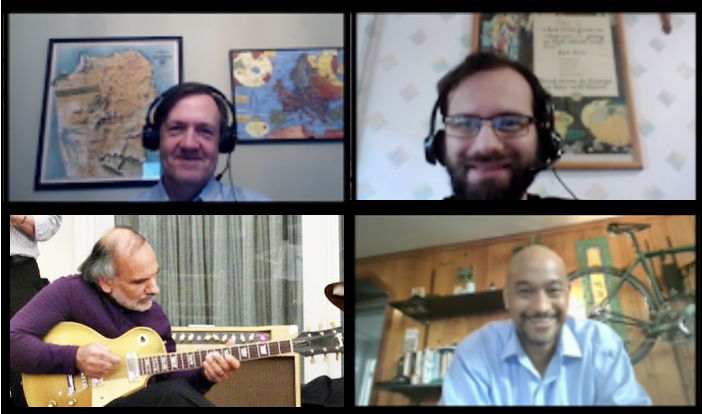Blog > What is Jazz Guitar Lessons for Adults?
Can I Learn Jazz Guitar on a Busy Schedule?
Learning a musical instrument is a rewarding experience that can improve cognitive abilities, relieve stress, and provide a sense of accomplishment. However, for busy adults, finding time to practice can be challenging. If you're interested in learning jazz guitar, you may be wondering if it's even possible to fit it into your schedule. The good news is that with the right approach, anyone can learn jazz guitar, no matter how busy they are.

Finding time in a busy schedule
The first step to learning jazz guitar on a busy schedule is to make a plan. Start by setting aside some time each day for practice, even if it's only 15-30 minutes. Having a consistent practice schedule will help you stay motivated and make progress. Consider using a calendar or scheduling app to block out time for practice each day. Make sure you choose a time that works best for you and your schedule.

When you're planning your practice sessions, be sure to set specific goals for what you want to achieve. For example, you might focus on learning a new chord progression, working on a specific technique, or memorizing a jazz standard. Having clear goals will help you stay focused and make progress.
Finally, remember to stay flexible and adjust your plan as needed. Life can be unpredictable, and sometimes unexpected events or responsibilities may get in the way of your practice time. Don't be too hard on yourself if you miss a practice session or fall behind on your goals. Simply reassess your plan and make adjustments as necessary to stay on track.
Understanding the importance of rhythm in jazz
Jazz guitar is all about rhythm, so it's important to focus on this aspect of playing. Start by practicing basic rhythms, such as quarter notes, eighth notes, and triplets. Once you've mastered these, move on to more complex rhythms, such as syncopation and swing. Practicing with a metronome or drum machine can help you develop a solid sense of timing.
Another way to improve your rhythm is to listen to jazz recordings and try to emulate the rhythm guitar parts. Pay attention to the way the guitar interacts with the other instruments in the band, and try to replicate that in your playing. You can also practice playing along with jazz recordings, which will help you develop your timing and phrasing.

The benefits of learning from a teacher

Learning jazz guitar on your own can be challenging, so it's important to seek out opportunities to learn from others. Consider taking lessons from a professional jazz guitarist, either in person or online. A good teacher can help you develop a solid foundation of technique and provide guidance on how to improve your playing.
Attending concerts and listening to jazz recordings can also be incredibly helpful in your learning journey. Studying the playing styles of jazz guitar legends such as Wes Montgomery, Joe Pass, and Pat Metheny can give you insights into how they approach playing, their use of chord progressions, and their improvisational techniques.
Another way to learn from others is to attend jam sessions or join a jazz ensemble. Playing with other musicians can be a great way to improve your improvisational skills and learn new techniques. You can also learn a lot by watching other guitarists play and asking them for tips and advice.
Learning jazz guitar on a busy schedule is definitely possible, but it requires a consistent and focused approach. By making a plan, focusing on rhythm, and learning from others, you can make progress and achieve your goals. Remember to be patient and persistent, and don't get discouraged if you hit roadblocks along the way. With dedication and hard work, anyone can learn to play jazz guitar.
Blog > What is Jazz Guitar Lessons for Adults?
Can I learn jazz guitar on a busy schedule?

Learning a musical instrument is a rewarding experience that can improve cognitive abilities, relieve stress, and provide a sense of accomplishment. However, for busy adults, finding time to practice can be challenging. If you're interested in learning jazz guitar, you may be wondering if it's even possible to fit it into your schedule. The good news is that with the right approach, anyone can learn jazz guitar, no matter how busy they are.
Finding time in a busy schedule
The first step to learning jazz guitar on a busy schedule is to make a plan. Start by setting aside some time each day for practice, even if it's only 15-30 minutes. Having a consistent practice schedule will help you stay motivated and make progress. Consider using a calendar or scheduling app to block out time for practice each day. Make sure you choose a time that works best for you and your schedule.

When you're planning your practice sessions, be sure to set specific goals for what you want to achieve. For example, you might focus on learning a new chord progression, working on a specific technique, or memorizing a jazz standard. Having clear goals will help you stay focused and make progress.
Finally, remember to stay flexible and adjust your plan as needed. Life can be unpredictable, and sometimes unexpected events or responsibilities may get in the way of your practice time. Don't be too hard on yourself if you miss a practice session or fall behind on your goals. Simply reassess your plan and make adjustments as necessary to stay on track.
Understanding the importance of rhythm in jazz

Jazz guitar is all about rhythm, so it's important to focus on this aspect of playing. Start by practicing basic rhythms, such as quarter notes, eighth notes, and triplets. Once you've mastered these, move on to more complex rhythms, such as syncopation and swing. Practicing with a metronome or drum machine can help you develop a solid sense of timing.
Another way to improve your rhythm is to listen to jazz recordings and try to emulate the rhythm guitar parts. Pay attention to the way the guitar interacts with the other instruments in the band, and try to replicate that in your playing. You can also practice playing along with jazz recordings, which will help you develop your timing and phrasing.
The benefits of learning from a teacher

Learning jazz guitar on your own can be challenging, so it's important to seek out opportunities to learn from others. Consider taking lessons from a professional jazz guitarist, either in person or online. A good teacher can help you develop a solid foundation of technique and provide guidance on how to improve your playing.
Attending concerts and listening to jazz recordings can also be incredibly helpful in your learning journey. Studying the playing styles of jazz guitar legends such as Wes Montgomery, Joe Pass, and Pat Metheny can give you insights into how they approach playing, their use of chord progressions, and their improvisational techniques.
Another way to learn from others is to attend jam sessions or join a jazz ensemble. Playing with other musicians can be a great way to improve your improvisational skills and learn new techniques. You can also learn a lot by watching other guitarists play and asking them for tips and advice.
Learning jazz guitar on a busy schedule is definitely possible, but it requires a consistent and focused approach. By making a plan, focusing on rhythm, and learning from others, you can make progress and achieve your goals. Remember to be patient and persistent, and don't get discouraged if you hit roadblocks along the way. With dedication and hard work, anyone can learn to play jazz guitar.





